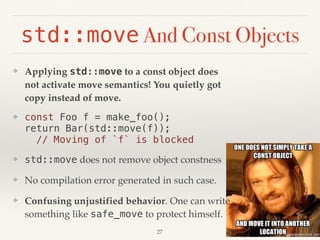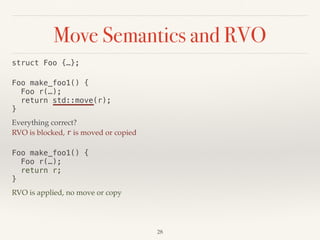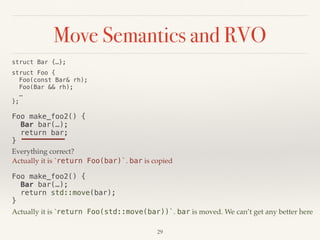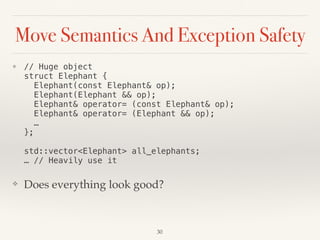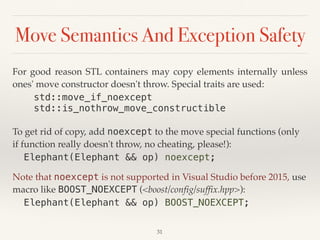This document discusses C++ rvalue references and move semantics. It begins with an overview and definitions of lvalues and rvalues from C and how they evolved in C++11. It then covers value categories like prvalues and xvalues introduced in C++11. The document explains how rvalue references allow objects to be moved instead of copied by extending their lifetime. It also discusses how classes can implement move semantics by adding move constructors and assignment operators. The document notes many ways C++ and the standard library support move semantics, like optimized containers, algorithms, traits and perfect forwarding. It ends with some examples of how to incorrectly use rvalue references and move semantics.
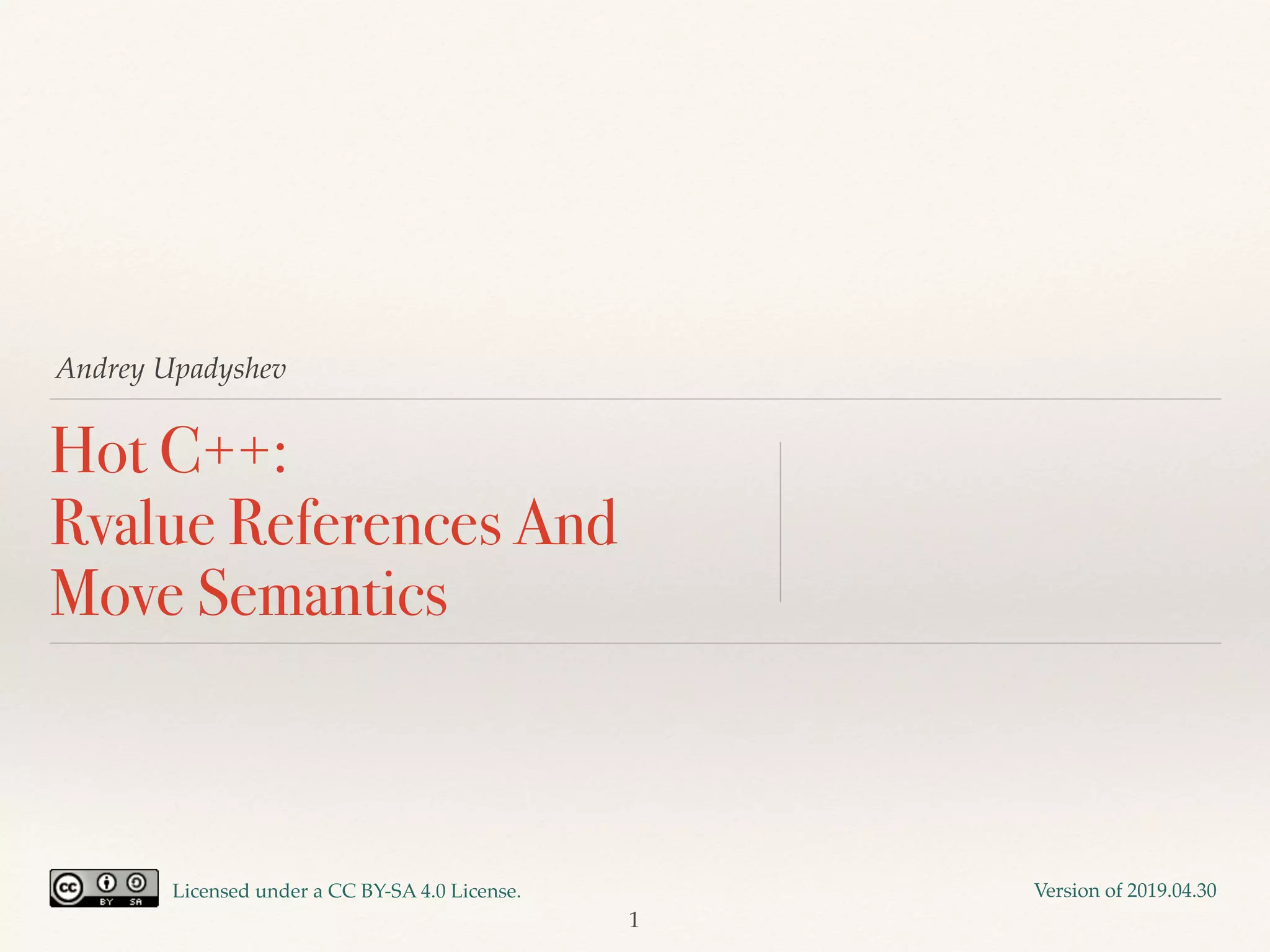
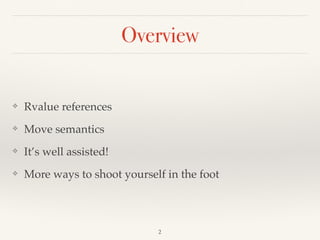
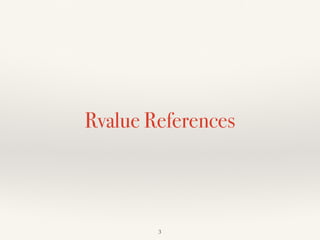
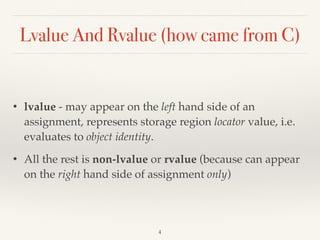
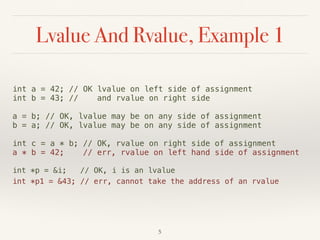
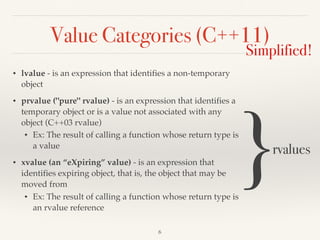
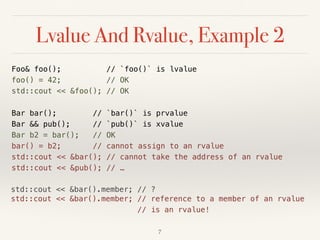
![Lvalue References
void foo(const Bar& bar); //[1]
Binds to lvalue and rvalue. Can not modify bar.
void foo(Bar& bar); //[2]
Binds to lvalue only. Can modify bar. (Very old Visual C++ versions
bind it to rvalue too. But this does not conform to the Standard)
!8
Bar read_bar(const char *filename);
foo(read_bar(“bar.txt”)); ?
foo(read_bar(“bar.txt”)); // [1] => bar is const](https://image.slidesharecdn.com/hotcrvaluereferencesandmovesemantics-190715090209/85/Hot-C-Rvalue-References-And-Move-Semantics-8-320.jpg)
![Rvalue References
!9
void foo(const Bar& bar); //[1]
Binds to lvalue and rvalue. Can not modify bar.
void foo(Bar& bar); //[2]
Binds to lvalue only. Can modify bar.
void foo(Bar && bar); //[3]
Binds to rvalue only. Takes precedence over lvalue overloads. Can
modify bar.
void foo(const Bar && bar); //[4]
Binds to rvalue only. Takes precedence over lvalue overloads. Can not
modify bar. [Almost] has no useful meaning. Use const ref overload
instead.
foo(read_bar(“bar.txt”)); // [3] => bar is mutable!](https://image.slidesharecdn.com/hotcrvaluereferencesandmovesemantics-190715090209/85/Hot-C-Rvalue-References-And-Move-Semantics-9-320.jpg)
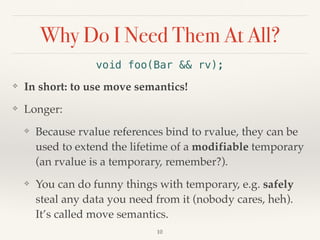
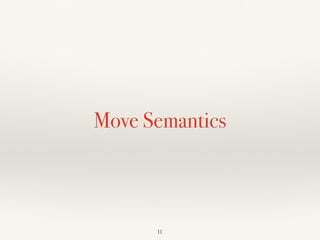
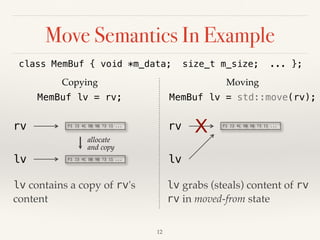
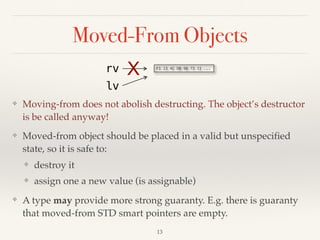
![Why Move Semantics?
The best possible performance for classes with expensive copy while
keeping the clear interface.
❖ std::vector<HugeObject> performing bad in C++03:
❖ Copies elements on insertion and even more on growing.
❖ Can be passed around only wrapped with smart pointer.
❖ So we used std::vector<std::shared_ptr<HugeObject>> or
boost::ptr_vector<HugeObject> to gain performance but got new problems:
❖ Extra allocation and extra level of indirection (performance!)
❖ Extra complexity
❖ Doesn’t work smoothly with STL algorithms (OK, ptr_vector does)
❖ Thanks to move semantics std::vector<HugeObject> become good in C++11
(finally!):
❖ Elements are moved on insertion and on growing
❖ No [smart] pointer involved overhead
❖ Clear and simple, STL algorithms works perfect
❖ Can be moved around
!14](https://image.slidesharecdn.com/hotcrvaluereferencesandmovesemantics-190715090209/85/Hot-C-Rvalue-References-And-Move-Semantics-14-320.jpg)
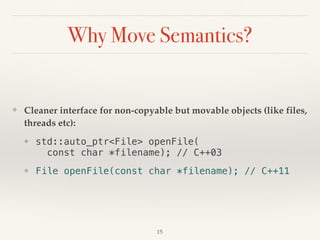
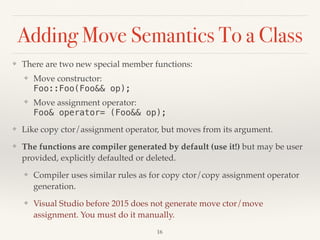
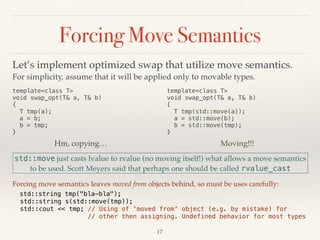

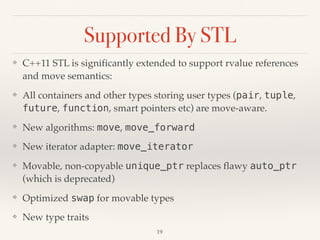
![Ref Qualifiers
❖ Member functions can be specified with ref-qualifier & or &&, placed
after cv-qualifier:
❖ const Foo& Bar::foo() const & { // [1]
return m_foo;
}
❖ Foo&& Bar::foo() && { // [2]
return std::move(m_foo); // `*this` is always
} // lvalue
❖ Allow to have different overloads for lvalue and rvalue (temporary).
❖ No ref-qualifier means “whatever” (for backward compatibility)
❖ A function with a ref-qualifier can not overload with a function without
one.
!20](https://image.slidesharecdn.com/hotcrvaluereferencesandmovesemantics-190715090209/85/Hot-C-Rvalue-References-And-Move-Semantics-20-320.jpg)
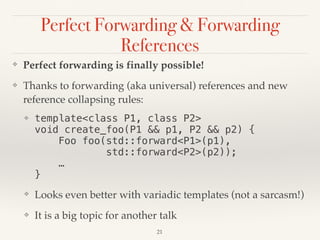
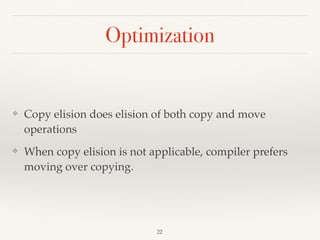
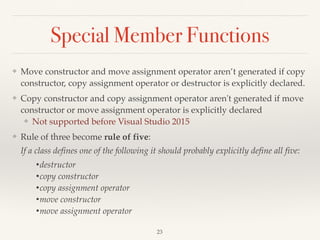

![Named Rvalue Reference Is Not an Rvalue
Foo::Foo(Bar && bar)
: m_bar(bar) {} //[1] Is something wrong?
Named rvalue reference identifies an object => it is lvalue.
i.e. bar is copied unless move semantics is forced
Foo::Foo(Bar && bar)
: m_bar(std::move(bar)) {} //[2] OK
Foo::Foo(Foo && rh)
: m_bar(rh.m_bar) {} //[3] copy, ref to lvalue member is an lvalue
Foo::Foo(Foo && rh)
: m_bar(std::move(rh.m_bar)) {} //[4] OK
// or even safer
: m_bar(std::move(rh).m_bar) {} //[5] OK, ref to rvalue member is
// rvalue
!25](https://image.slidesharecdn.com/hotcrvaluereferencesandmovesemantics-190715090209/85/Hot-C-Rvalue-References-And-Move-Semantics-25-320.jpg)
![Returning of Rvalue Reference
Foo && make_foo() { //[1] Is something wrong?
return Foo(42);
}
An rvalue reference is a reference. Returning a reference to a
local object is bad. Return by value instead
Foo make_foo() { //[2] OK
return Foo(42);
}
Return rvalue reference only when you really know that you need this. A right
example is std::move:
template<class T>
typename std::remove_reference<T>::type&& std::move(T && t) {
return static_cast<typename std::remove_reference<T>::type &&>(t);
}
!26](https://image.slidesharecdn.com/hotcrvaluereferencesandmovesemantics-190715090209/85/Hot-C-Rvalue-References-And-Move-Semantics-26-320.jpg)
